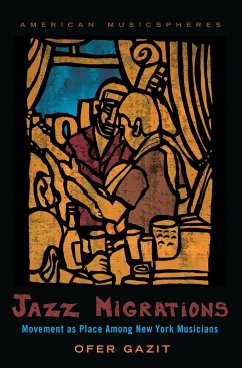Since the 1990s, migrant musicians have become increasingly prominent in New York City's jazz scene. Challenging norms about who can be a jazz musician and what immigrant music should sound like, these musicians create mobile and diverse notions of jazz while inadvertently contributing to processes of gentrification and cultural institutionalization. In
Jazz Migrations, author Ofer Gazit discusses the impact of contemporary transnational migration on New York jazz, examining its effects on educational institutions, club scenes, and jam sessions. Drawing on four years of musical participation in the scene, as well as interviews with musicians, audience members, venue owners, industry professionals, and institutional actors, Gazit transports readers from music schools in Japan, Israel, and India to rehearsals and private lessons in American jazz programs, and to New York's immigrant jazz hangouts: an immigrant-owned music school in the Bronx; a weekly jam session in a Haitian bar in central Brooklyn; a Colombian-owned jazz room in Jackson Heights, Queens; and a members-only club in Manhattan. Along the way, he introduces the improvisatory practices of a cast of well-known and aspiring musicians: a South Indian guitarist's visions of John Coltrane and Carnatic music; a Chilean saxophonist's intimate dialogue with the sound of Sonny Rollins; an Israeli clarinetist finding a home in Brazilian Choro and in Louis Armstrong's legacy; and a multiple Grammy-nominated Cuban drummer from the Bronx. Jazz Migrations concludes with a call for a collective reconsideration of the meaning of genre boundaries, senses of belonging, and ethnic identity in American music.
Dieser Download kann aus rechtlichen Gründen nur mit Rechnungsadresse in A, B, BG, CY, CZ, D, DK, EW, E, FIN, F, GR, HR, H, IRL, I, LT, L, LR, M, NL, PL, P, R, S, SLO, SK ausgeliefert werden.









